Related Research Articles
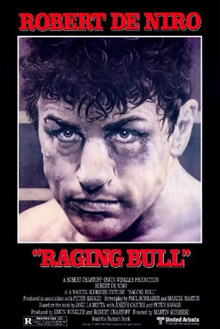
Raging Bull is a 1980 American biographical sports drama film directed by Martin Scorsese and starring Robert De Niro, Joe Pesci, Cathy Moriarty, Nicholas Colasanto, Theresa Saldana and Frank Vincent. The film is an adaptation of former middleweight boxing champion Jake LaMotta's 1970 memoir Raging Bull: My Story. It follows the career of LaMotta, played by De Niro, his rise and fall in the boxing scene, and his turbulent personal life beset by rage and jealousy.

Seven Samurai is a 1954 Japanese epic samurai film co-written, edited, and directed by Akira Kurosawa. Taking place in 1586 in the Sengoku period of Japanese history, it follows the story of a village of desperate farmers who seek to hire rōnin to combat bandits who will return after the harvest to steal their crops.
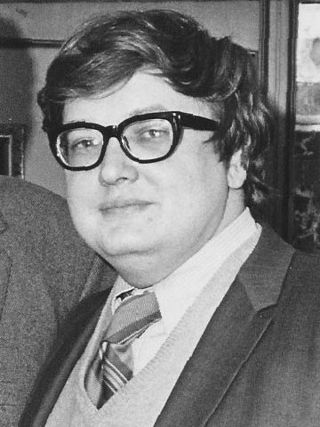
Roger Joseph Ebert was an American film critic, film historian, journalist, essayist, screenwriter, and author. He was a film critic for the Chicago Sun-Times from 1967 until his death in 2013. In 1975, Ebert became the first film critic to win the Pulitzer Prize for Criticism. Neil Steinberg of the Chicago Sun-Times said Ebert "was without question the nation's most prominent and influential film critic," and Kenneth Turan of the Los Angeles Times called him "the best-known film critic in America."
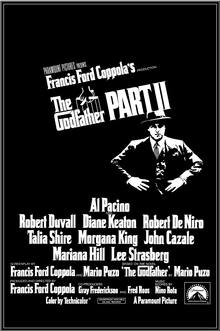
The Godfather Part II is a 1974 American epic crime film. The film is produced and directed by Francis Ford Coppola, loosely based on the 1969 novel The Godfather by Mario Puzo, who co-wrote the screenplay with Coppola. It is both a sequel and a prequel to the 1972 film The Godfather, presenting parallel dramas: one picks up the 1958 story of Michael Corleone, the new Don of the Corleone family, protecting the family business in the aftermath of an attempt on his life; the prequel covers the journey of his father, Vito Corleone, from his Sicilian childhood to the founding of his family enterprise in New York City. The ensemble cast also features Robert Duvall, Diane Keaton, Talia Shire, Morgana King, John Cazale, Mariana Hill, and Lee Strasberg.

Rear Window is a 1954 American mystery thriller film directed by Alfred Hitchcock and written by John Michael Hayes based on Cornell Woolrich's 1942 short story "It Had to Be Murder". Originally released by Paramount Pictures, the film stars James Stewart, Grace Kelly, Wendell Corey, Thelma Ritter, and Raymond Burr. It was screened at the 1954 Venice Film Festival.

Some Like It Hot is a 1959 American crime comedy film directed, produced and co-written by Billy Wilder. It stars Marilyn Monroe, Tony Curtis and Jack Lemmon, with George Raft, Pat O'Brien, Joe E. Brown, Joan Shawlee and Nehemiah Persoff in supporting roles. The screenplay by Wilder and I. A. L. Diamond is based on a screenplay by Robert Thoeren and Michael Logan from the 1935 French film Fanfare of Love. The film is about two musicians who disguise themselves by dressing as women to escape from mafia gangsters whom they witnessed committing a crime.
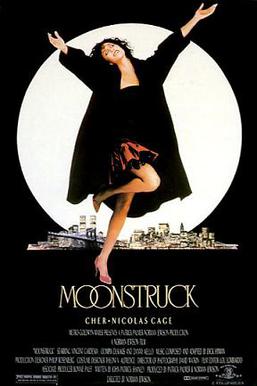
Moonstruck is a 1987 American romantic comedy-drama film directed and co-produced by Norman Jewison, written by John Patrick Shanley, and starring Cher, Nicolas Cage, Danny Aiello, Olympia Dukakis, and Vincent Gardenia. The film follows Loretta Castorini, a widowed Italian-American woman who falls in love with her fiancé's hot-tempered, estranged younger brother.

The Seventh Seal is a 1957 Swedish historical fantasy film written and directed by Ingmar Bergman. Set in Sweden during the Black Death, it tells of the journey of a medieval knight and a game of chess he plays with the personification of Death, who has come to take his life. Bergman developed the film from his own play Wood Painting. The title refers to a passage from the Book of Revelation, used both at the very start of the film and again towards the end, beginning with the words "And when the Lamb had opened the seventh seal, there was silence in heaven about the space of half an hour." Here, the motif of silence refers to the "silence of God," which is a major theme of the film.
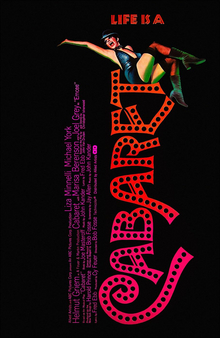
Cabaret is a 1972 American musical period drama film directed by Bob Fosse from a screenplay by Jay Presson Allen, based on the stage musical of the same name by John Kander, Fred Ebb, and Joe Masteroff, which in turn was based on the 1951 play I Am a Camera by John Van Druten and the 1945 novel Goodbye to Berlin by Christopher Isherwood. It stars Liza Minnelli, Michael York, Helmut Griem, Marisa Berenson, Fritz Wepper, and Joel Grey. Multiple numbers from the stage score were used for the film, which also featured three other songs by Kander and Ebb, including two written for the adaptation.

Richard E. Roeper is an American columnist and film critic for the Chicago Sun-Times. He co-hosted the television series At the Movies with Roger Ebert from 2000 to 2008, serving as the late Gene Siskel's successor. From 2010 to 2014, he co-hosted The Roe and Roeper Show with Roe Conn on WLS-AM. From October 2015 to October 2017, Roeper served as the host of the FOX 32 morning show Good Day Chicago.

The Apu Trilogy comprises three Indian Bengali-language drama films directed by Satyajit Ray: Pather Panchali (1955), Aparajito (1956) and The World of Apu (1959). The original music for the films was composed by Ravi Shankar.
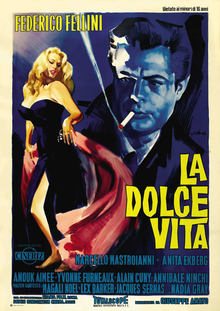
La Dolce Vita is a 1960 satirical comedy-drama film directed and co-written by Federico Fellini. The film stars Marcello Mastroianni as Marcello Rubini, a tabloid journalist who, over seven days and nights, journeys through the "sweet life" of Rome in a fruitless search for love and happiness. The screenplay, written by Fellini and three other screenwriters, can be divided into a prologue, seven major episodes interrupted by an intermezzo, and an epilogue, according to the most common interpretation.
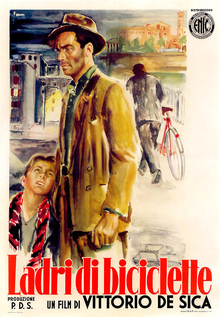
Bicycle Thieves, also known as The Bicycle Thief, is a 1948 Italian neorealist drama film directed by Vittorio De Sica. It follows the story of a poor father searching in post-World War II Rome for his stolen bicycle, without which he will lose the job which was to be the salvation of his young family.

The Three Colours trilogy is the collective title of three psychological drama films directed by Krzysztof Kieślowski: Three Colours: Blue (1993), Three Colours: White (1994), and Three Colours: Red (1994), represented by the Flag of France. An international co-production between France, Poland, and Switzerland in the French language, with the exception of White in Polish and French, all three installments were co-written by Kieślowski and Krzysztof Piesiewicz, produced by Marin Karmitz and composed by Zbigniew Preisner.
This is a chronological list of films and television programs that have been recognized as being pioneering in their use of computer animation.

Smiles of a Summer Night is a 1955 Swedish comedy film written and directed by Ingmar Bergman. It was shown at the 1956 Cannes Film Festival. In 2005, TIME magazine ranked it as one of the 100 greatest films since 1923.

Apur Sansar, also known as The World of Apu, is a 1959 Indian Bengali-language drama film produced, written and directed by Satyajit Ray. It is based on the second half of Bibhutibhushan Bandopadhyay's novel Aparajito. Following Pather Panchali (1955) and Aparajito (1956), The World of Apu is the final part of Ray's The Apu Trilogy, about the childhood and early adulthood of a young Bengali named Apu in early twentieth century India. The World of Apu stars Soumitra Chatterjee and Sharmila Tagore ; the duo would go on to appear in many subsequent Ray films.

Epic films are a style of filmmaking with large scale, sweeping scope, and spectacle. The usage of the term has shifted over time, sometimes designating a film genre and at other times simply synonymous with big-budget filmmaking. Like epics in the classical literary sense, it is often focused on a heroic character. An epic's ambitious nature helps to set it apart from other types of film such as the period piece or adventure film.

Richard Nelson Corliss was an American film critic and magazine editor for Time. He focused on movies, with occasional articles on other subjects.

Extreme cinema is a subgenre used for films distinguished by its use of excessive sex and violence, and such various extreme nature as mutilation and torture. It recently specializes in genre film, mostly both horror and drama.
References
- ↑ "Tim Dirks". Rotten Tomatoes.
- ↑ Dirks, Tim. "300 Greatest Films".
- ↑ Ebert, Roger. "References to Filmsite". Filmsite.org. Retrieved May 20, 2012.
- ↑ "Top 100 Films by the Internet Movie DataBase (IMDb)". Filmsite.org. Retrieved Nov 13, 2020.
The films are provided as a comparative measure with the Greatest Films Lists on this site.
- ↑ THE CS TEAM (5 October 2016). "Tim Dirks' Filmsite Is a One-Man IMDb". CultureSonar.com.